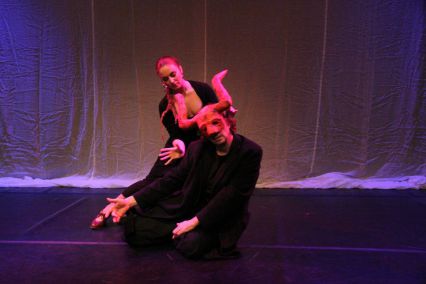The Fringe has always been full of mythic tales and variations on stories of Gods and monsters. Playwright Lee Gershuny has her own take on one of the most famous myths with The Element’s World Theatre’s Theseus and the Minotaur – A Love Story. I caught up with Lee to discuss the show.
Could you tell us a little about the meaning of the show’s intriguing subtitle?
When the Minotaur first meets Theseus he realises that no-one has come to kill him before, they’ve always come to be killed. This is challenging and exciting for him, and he finally has a friend he can discuss – as he puts it in the play – the meaning of life, why Theseus has no wife and other things with. The Minotaur has been locked in there since childhood so the Minotaur is a kind of innocent, a free child, a wild child and Theseus is an experienced monster killer.
So this is like wild-child meeting sophisticated, worldly killer; it’s a very humbling experience for Theseus to come face to face with death, and he has differently powerful levels of awareness (one is that he’s never loved anyone). The Minotaur is very seductive like a playful child and the Minotaur discovers “is this what men do? I’d like to be a man and sit down and talk to each other.” So there are big responses to conditions each one makes from the position or life each one has led – and it’s very humbling for Theseus, but at the same time we don’t change the myth.
The story is partially told through breaking news. Was this a comment on the prevalence of 24hr news or the selective way the news is told?
All of that and a bit more. The more is slightly satirical of the dramatisation of the news. The news presenters have already liaised before the play begins so their emotions start flaring up. They are part of the love theme because jealously emerges when Theseus steps off the boat with his Queen Phaedra and the male news presenter falls for her and starts going after her – and his partner gets very jealous. So they become authentic instead of a phoney dramatisation of events.
The Company is called the Elements and there are a lot of elements to the play, one of which is the addition of flamenco dance to the show. What was the thinking behind this?
Good question. Well firstly we’re The Elements World Theatre Company so we tend to cross genre and cultural styles. For instance, we’ve included elements such as South Indian dance in the past. The reason behind the flamenco was the idea of the bullfight, that, and I saw this absolutely extraordinary flamenco dancer who was staying in Edinburgh for a while called Mayte Beltran. As I knew in advance I was going to have flamenco music and dance, she was the one.
There are a lot of issues dealt with in the play – love, death, ambition, fear etc. Is there an overarching message of the work?
There is something about awareness and recognising the humility in our mortality. There’s coming face to face with the fact that now is the moment of power and now is the time to act or we could be dead. I regard that for the planet and for our cultural values. Theseus becomes King and he makes a speech to the audience and says we’re not sending young people off to be slaughtered by the Minotaur anymore. No more martyrs, you are safe out of love rather than violence. It’s love for his people not to send the best Athenian youth to be slaughtered as tribute to the most powerful King – Minos of Crete.
Each year (alongside Shakespeare) the festival contains dozens of performances based upon the Greek Myths. What do you think the lasting appeal of these 4000 year-old stories is?
They’re archetypes, they’re universal. Greek myths and mythology – which is what the Elements World Theatre does, deconstructing myths, fairytales etc – are really astute observations of human nature. Whether it’s the Mahabharata of India, which is repeated over and over again in different forms or Shakespeare, these are archetypal themes of human nature and maybe our own godliness as well. Theseus was conceived by two fathers, Poseidon and Aegeus. So he is both God and man, and this is also an awareness of our power and our connection with the divine in us. So there’s a spiritual element – not religious – about our power to choose in the midst of conflict and losing his sophistication in the face of death and becoming a man. Naked really. So I think they’re archetypal questions: what does it mean to be a man? What does it mean to love unconditionally?
